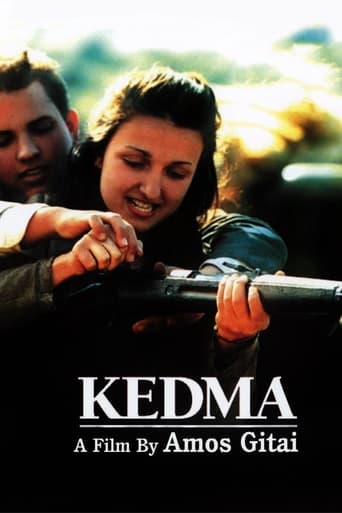GamerTab
That was an excellent one.
Cathardincu
Surprisingly incoherent and boring
Konterr
Brilliant and touching
Janae Milner
Easily the biggest piece of Right wing non sense propaganda I ever saw.
samkan
If our megaplexes would play nothing but slice of history works like KEDMA we would all be more sympathetic and compassionate. This film depicts a small slice of an historic migration that, truthfully, requires a bit of acquired knowledge by it's viewers. That said, it's almost done in realtime (which some may find boring or exhausting) and the character dialog can get a bit preachy at times. But excellent effect. Deserves reverence if only for its passion and determination. The soliloquy at the end is a bit much and mars the otherwise muted and ambiguous nature of the story of the creation of Israel. But the overall effect is quite profound. Fervor and desire by the filmmakers herein overcomes lack of technical expertise.
ynhockey
The story of the founding of the State of Israel is one of war, suffering, refugees, political intrigues, miracles and whatnot. Taking any of the above attributes and making a movie that focuses on it cannot leave you with a bad movie. Even a completely talentless director could make an entertaining film out of the Israeli independence story. But somehow Amos Gitai managed to make even this important and exciting episode of modern history into an amateurish and boring series of scenes, which is hard to actually call a film.The movie can be summed up fairly simply: Have you read Antigone, or another similar ancient Greek tragedy? Well, imagine an ancient Greek performance of Antigone filmed with a $200 camera, without any cinematographic additions. The scenes are not linked in almost any way, the dialog seems uninspired, as if read from a piece of paper, and the 'message' of the film is told by a raving side character.The acting is terrible, the choice of cast mediocre at best, and while the film makes use of several languages, even someone who understands them will have trouble watching the movie without subtitles, because most of the actors themselves don't pronounce anything correctly.In short, a horrible movie from a horrible director. Not recommended to anyone.
dino514
This movie is perhaps the slowest and most boring film I have ever seen. It is a pretentious attempt by Amos Gitai to remake Israel's national birth myth in his slow and artistic style. However, this time he fails miserably. From the opening scene that takes 10 minutes before anyone even opens their mouth the the closing speeches that are so melodramatic that they don't at all fit in with the otherwise painfully realistic piece, the movie is a disaster all the way through. In addition to its plodding style and one dimensional characters the movie is rife with factual errors. It mention fictional ghetto revolt, depicts the British army as a weak and unmotivated school marching band that speaks in American accents and seems to condense an entire year of war and struggle into one day. This movie is both a horrible depiction of Israeli history and a disastrous piece of entertainment and I would only recommend it to those who are in desperate need for a long sleep. Please do not see this embarrassment of a movie unless forced to by a man with a large gun.
luckystrike6
I'm not sure I got what I was supposed to get out of this film. As a piece of cinema it was an interesting way to shoot a low budget movie. With long, almost entirely wide-angle shots that hardly move at all, (except for a magnificent opening sequence and some hand-held work later on) it's staged and paced like a series of short plays. Some of the settings are just too simplistic; visually there isn't a lot going on besides the stories of the people coming in and out of the frame. There's no main protagonist in the film; numerous characters come and go, unresolved, sharing nearly equal screen time, but never quite enough of it to make any one of them more than a two-dimensional expression of a social theme. This dispassionate attitude gives "Kedma" a very documentary feel for the first two acts. It is the third act which is confusing, and even as a Jew with family in Israel, I feel severely underqualified to interpret Amos Gitai's true intentions with it. Watched with one set of eyes, it could be called a relatively simplistic portrayal of the birth of a nation, which throws its hands up to a certain extent and spreads the blame for the current situation around widely enough to defuse the certain blowback this film was to receive from the Orthodox community. On the other hand, in blaming Christianity, the Talmud and the Messianic tradition for enforcing the diaspora mentality over the past 2000 years, it stops right on the doorstep of declaring the modern State of Israel a product of the Jews' inheritance of the Nazi mentality which drove them there in the first place. Now: This isn't what I'm saying, but it might well be what the film is saying. At the very least it states boldly that the heroic Sabra stance is nothing more than the bitter side of the slave mentality, an ongoing form of self- flagellation. Only, the movie doesn't give you any inkling that this is where it's taking you as it leads you on in documentary form; and the result is definitely shocking. This is not a movie which apologizes for any outburst of emotion; nor does it pay much homage to the myth of the historical Maccabee. In short, it is about the weak preying on the weaker. Whether or not its stance is correct or covers the entire picture, again, I'm not qualified to say. There are certainly several other sides to the conversation than the one this film snakes its way into advancing. It's not a coincidence, either, that "Kedma" is the name of the refugee ship the Jewish characters arrive on; this movie, if nothing else, is the anti-"Exodus." None of the above, by the way, makes this film particularly enjoyable to watch. But if you like watching painful and well-crafted work that makes you think, well...it's still not that enjoyable to watch, but at moments it's completely riveting.





